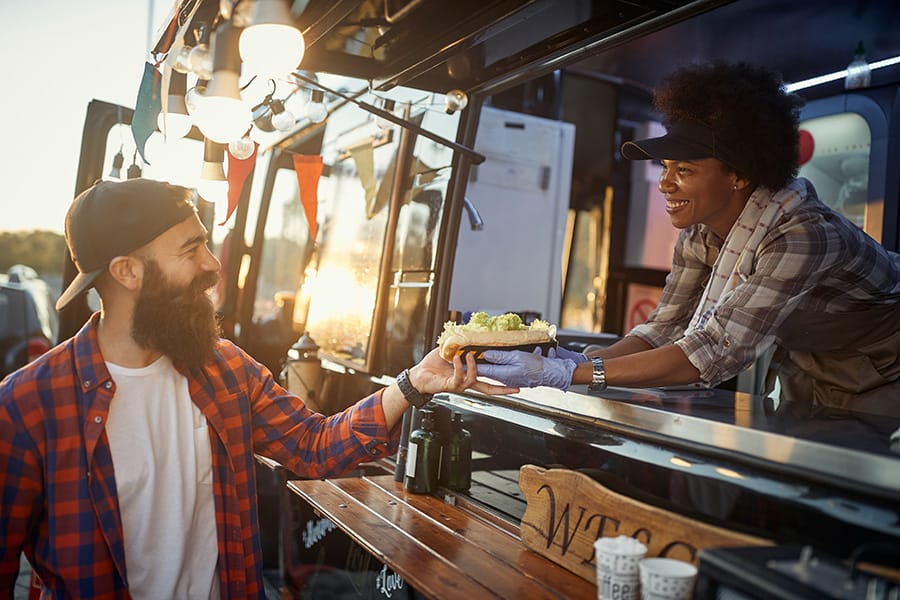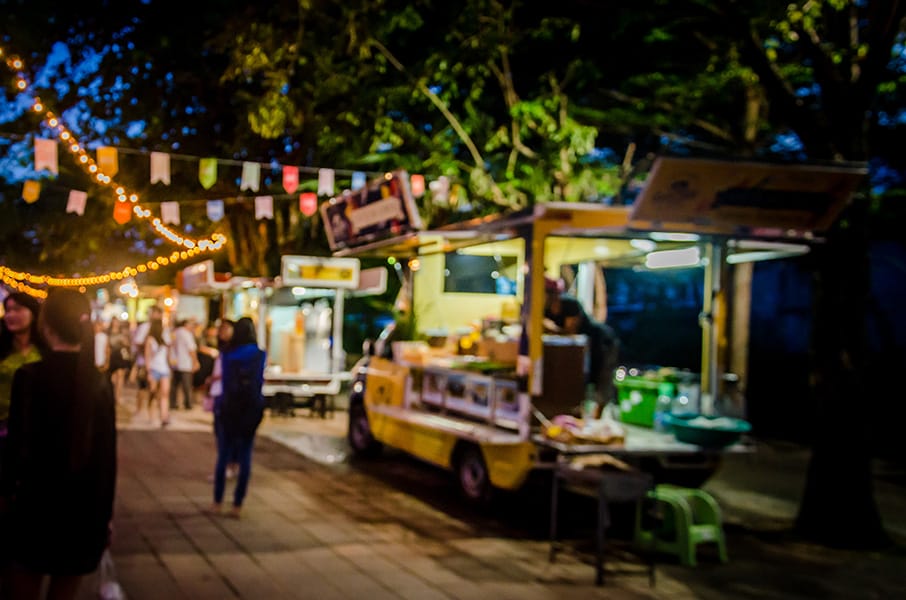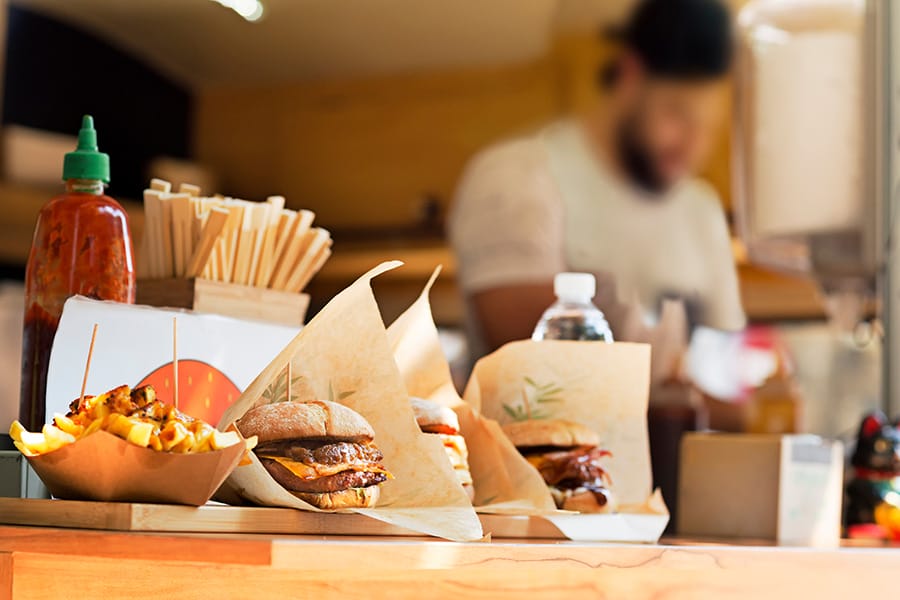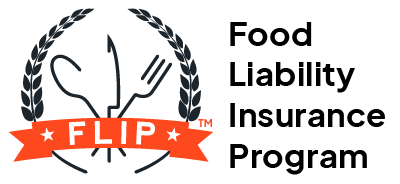Running a food truck business is a unique experience. Not bound to any one location like a brick-and-mortar restaurant, you can take your show on the road (literally!) and serve up delicious foods and beverages at a plethora of places.
But operating a food truck also comes with its fair share of risks. Whether you’re serving up gourmet burgers or boba tea, there’s always a chance something could go awry. As a result, you might’ve heard people talk about getting general liability insurance for your food truck.
If you’re not sure what general liability insurance is or whether or not you need it, you’re not alone. The short answer is that yes, food trucks do need general liability insurance, and we’re going to break down the reasons why.
From financial security to enhanced professionalism, carrying general liability insurance is critical for your food truck’s success. First, let’s dive into what this insurance is and what it covers before taking a look at how it can benefit your business and how you can get insured today.

What Is General Liability Insurance?
General liability insurance is a type of coverage designed to shield your food truck business against third-party claims, including:
- Bodily injury
- Property damage
- Advertising or personal injury
You might be familiar with these terms, but let’s take a closer look at what each of them means, as well as some examples of what’s covered under general liability insurance.
Third-Party Bodily Injury
If someone other than you or your employees suffers a bodily injury because of your business and holds you financially responsible for it, that’s a third-party bodily injury claim.
Claim Example: You have an awning over the window of your food truck where customers go to order that helps shade them from the sun or keeps them dry when it rains. On a particularly windy day at a food truck rally, you’re taking a customer’s order when the wind blows the awning off. It falls on top of the customer and injures them.
That customer then sues you to pay for their medical fees and to recover any wages they lost while they were recovering from the injury. Your general liability insurance could respond to this claim and help mitigate—or eliminate—the amount you’ll pay out of pocket.
Third-Party Property Damage
One of the best parts of owning a food truck business is mobility. Being able to take your business to various locations gives you a lot of freedom, but it also means you’ll be parking your truck and operating on someone else’s property.
If you accidentally damage that property and the property owner holds you responsible for repairing or replacing what you broke, that would be considered a property damage claim.
Claim Example: On that same windy day, the tent that you have set up outside of your truck to cover a seating area blew over and into the truck parked right next to you. The side of the truck was dented and scratched as a result.
With general liability insurance, you could receive financial assistance if the owner of that food truck sues you to cover the cost of repairs.
Advertising or Personal Injury
If your business is sued for libel or slander or a customer sues you for false advertising, your general liability policy could help pay for your defense costs if you file an advertising or personal injury claim. This could include attorney’s fees, settlement costs, and other expenses stemming from the lawsuit.
Claim Example: You attended a food truck festival and had a terrible experience. You feel like the event was completely mismanaged and post about your bad experience online, warning other food truck owners not to attend that festival.
Unfortunately, the festival organizers see this and sue you for slander. With general liability insurance, you could file a personal and advertising injury claim to help cover your defense costs.

Why Do Food Trucks Need General Liability Insurance?
1. It Provides a Financial Safety Net
Think of general liability insurance as another layer of protection on your financial safety net. Any good business owner knows that you should have money saved for emergencies or unexpected expenses, but some claims can be so costly that they may bring your operations to a halt while you try to pay them off.
For example, if you were to get sued by a customer who suffered a bodily injury from your food truck, you could be forced to pay for medical bills, lost wages, and possibly even legal fees if you need to hire a defense lawyer, come to a settlement, etc.
This could easily cost you thousands or even tens of thousands of dollars, which is no small expense. But, if you have a general liability policy for your food truck, you could receive financial support to pay out these claims.
That assistance could mean the difference between closing your business (even temporarily) and keeping things up and running while you settle a claim. The peace of mind you get from being insured is well worth the cost of your premium.
2. You May Be Required to Carry Insurance
Interested in participating in a food truck rally, festival, or other type of event one day? Well, there’s a good chance you won’t be able to without insurance. Most events require participants to provide proof of insurance before they’ll allow you to participate.
It’s also common for event organizers to ask you to add them and/or the event itself to your policy as an additional insured. An additional insured is a third party that requires you to add them to your policy. Examples of common additional insureds include:
- Landlords
- Venues
- Event organizers
- Businesses that hire you as an independent contractor
By adding the event to your policy as an additional insured, they receive protection from your liability. This means that if the food truck rally you participated in gets sued because of your negligence, they could receive coverage from your insurer.
3. It's Good for Your Image
Not only does insurance protect your finances and allow you to participate in events and festivals, but it can also seriously bolster your business’ reputation.
Some people think that having insurance makes it look like they feel something is likely to go wrong with their business; that they’re expecting the worst, and that’s not a good look. But really, this couldn’t be further from the truth!
When you let customers and anyone you do business with know that your food truck is insured, it’s a sign of professionalism and legitimacy. You recognize that mistakes do happen, no matter how careful you are, and if one does happen you’re prepared to cover the cost of making things right.

How Can I Get General Liability Insurance for My Food Truck?
While you may be able to purchase a standalone general liability policy, this coverage is typically included alongside others in a business insurance package. After all, most food truck businesses will need more than just general liability insurance to properly protect them from common claims.
Luckily, getting a comprehensive insurance policy is easy with Food Liability Insurance Program (FLIP), the most trusted name in food vendor insurance. FLIP’s affordable food truck insurance policy includes general liability coverage, as well as:
- Product liability: Can protect you in the event your product gives a customer food poisoning or an allergic reaction (included)
- Damage to premises rented: Coverage for if you damage a rented space, such as a spot at a farmers market (included)
- Tools and equipment: Can provide financial assistance if your business equipment is stolen or damaged (optional)
These coverages work together to help protect your food truck business from the claims you’re most likely to face in the course of doing business, all for as low as $25.92 a month.
With a FLIP policy, you can receive coverage for your food truck while it’s parked at a location for the purpose of vending, like a farmers market or a food festival. It’s important to note that food truck insurance is not the same as commercial auto insurance, which FLIP doesn’t offer at this time.
FLIP allows you to add an unlimited number of additional insureds to your policy, all at no cost to you. If you’re vending at events, you’ll be able to add event organizers to your policy with ease, right in your dashboard, 24/7.
Ready to protect your finances and invest in your business? Complete your online application in 10 minutes or less and get your instant Certificate of Insurance from FLIP today!
Safeguard Your Business With General Liability Insurance

By Alex Hastings
Alex is a Marketing Copywriter at Food Liability Insurance Program (FLIP). In her free time, she enjoys reading, birding, traveling, and finding any excuse to get brunch.

